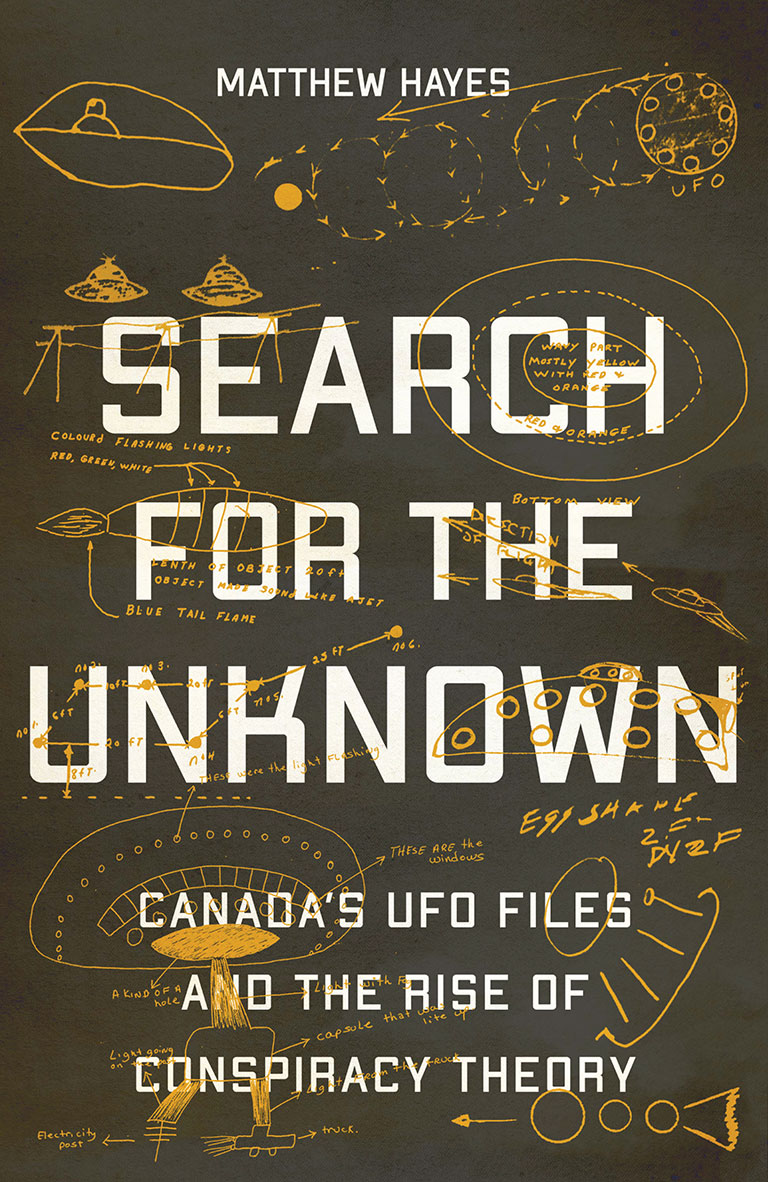Search for the Unknown

Search for the Unknown: Canada’s UFO Files and the Rise of Conspiracy Theory
by Matthew Hayes
McGill-Queen’s University Press
244 pages, $34.95
Canada’s UFO investigation files are held at Library and Archives Canada in Ottawa. When I was a reference archivist there in the mid-1990s, we received almost weekly inquiries about UFO records, especially after an episode of The X-Files aired on television.
Researchers ranging from the curious to the odd came in with an expectation that the archivists were gatekeepers and agents of the “Deep State.” Instead, as archivists we guided them through the finding aids on how to read the material, much of which had been opened under previous access-to-information requests. I, too, poked through the files, fascinated by the eyewitness accounts of unexplained phenomena, of strange sightings in the skies, as well as the hand-drawn sketches (never photographs) of UFOs that shot out fire and were usually saucer-like in shape. I felt the files would make the foundation for a good book.
That good book has now been written by Matthew Hayes, based on his Ph.D. dissertation from Trent University. Search for the Unknown explores the many accounts by Canadians of UFO sightings but also attempts to unpack the meaning behind these reports. Working from thousands of pages of archival documents drawn from multiple government departments, Hayes searches for patterns in the 4,500 individual cases submitted by Canadians or investigated by the RCMP.
Beginning in the late 1940s, as the Cold War with the Soviet Union deepened, reports of sightings trickled in to government departments from concerned citizens. Many seem to have been influenced by the threat of Soviet bombers invading Canada, with that fear supercharged by pop-culture novels, television shows, and films.
Hayes uses the stories about UFOs as a lens through which to analyse the interactions of citizens with the state. His observations on the responses of public servants offer new insights into the inner workings of bureaucracies and how they struggled to respond to reports that, in the words of one investigator, contained “so few facts.”
He draws out the stories of a number of key individuals and government working groups that sought to examine the phenomenon of UFOs, showing how they coordinated responses and carried out investigations — as well as how most were ultimately shuttered because civil servants, scientists, and service personnel did not believe in the value of pursuing the reported UFO sightings.
At the same time, the interplay of an avalanche of films, non-fiction books, and all the other “weird tales” continued to stoke the belief in UFOs. The imagined aliens of multiple movies were either trying to aid humanity or secretly plotting to end it. Many of the stories presented in popular culture were reflected in the eyewitness reports the RCMP investigated, including crop circles and unexplained lights in the sky.
All of this makes for fascinating reading, although Hayes’s secondary argument, as captured in the subtitle — that belief in UFOs led to “the rise of conspiracy theory” — is weakly supported. There were, of course, a few cases of Canadians who accused authorities of cover-ups and conspiracies. But the evidence is slight, and surely the rise of the conspiracy theories that currently drive certain discourses in the United States — and, to a lesser extent, in Canada — was fanned by many other factors, some of them nefarious.
Perhaps the greatest UFO and alien hunter in popular culture is the fictional Fox Mulder of The X-Files, whose quest to uncover alien and government conspiracies led to the series’ tagline and pop-culture reference: “The truth is out there.” It may be, but Hayes reveals in this fine book that some truths can be found in the archives.
We hope you’ll help us continue to share fascinating stories about Canada’s past by making a donation to Canada’s History Society today.
We highlight our nation’s diverse past by telling stories that illuminate the people, places, and events that unite us as Canadians, and by making those stories accessible to everyone through our free online content.
We are a registered charity that depends on contributions from readers like you to share inspiring and informative stories with students and citizens of all ages — award-winning stories written by Canada’s top historians, authors, journalists, and history enthusiasts.
Any amount helps, or better yet, start a monthly donation today. Your support makes all the difference. Thank you!
Themes associated with this article
Advertisement
With 7 uniquely curated newsletters to choose from, we have something for everyone.
Save as much as 40% off the cover price! 4 issues per year as low as $29.95. Available in print and digital. Tariff-exempt!




